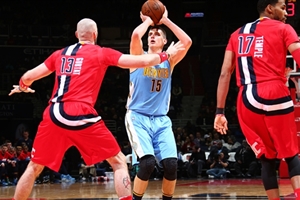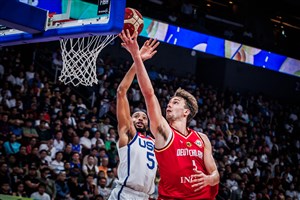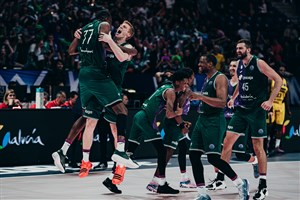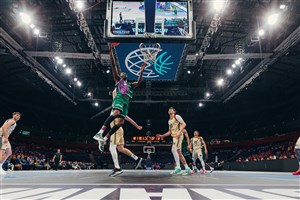
Time to develop the argument
MELBOURNE (Paulo Kennedy’s View from Downunder) - Word has the NBL considering allowing three imports next season, along with the possibility of an "Asian import", reigniting the discussion about the league’s developmental responsibilities.
With the NBL currently boasting just 56 Australian players - for much of its existence it has averaged around 100 - the obvious effects of reducing that number are being thrashed out.
In his blog supporting the idea this week, Boti Nagy wrote "the NBL owes almost zero to development", but does that claim survive under the spotlight? Consider that Andrew Gaze, Shane Heal, Brett Maher, Mark Bradkte, Chris Anstey, Sam Mackinnon, Glen Saville, Matt Nielsen, Mika Vukona, Adam Gibson, Chris Goulding, Corey Webster and Tom Abercrombie all learned their trade in the NBL.
Breakers with another fastbreak dunk #HardBall @TsvCrocs @NZBreakers https://t.co/bzWSqv6Dus
— NBL (@NBL) January 29, 2016
That list includes many of the all-time greats of the competition and some of the best of this era, all of whom have developed from young rookies into stars of the NBL and in many cases the international game. It doesn't include the countless others who have learned the ropes in the NBL and gone on to be fan favourites or pillars on successful teams.
The above list suggests the NBL owes a great deal of its past and present to the development of talent. The question for the future is, if the NBL isn’t developing its own talent, who is?
If the NCAA is developing the NBL's generation next, let me give you a little test. How many Aussies have returned from a four-year college stint in the past decade and become long-term influential players? The list is pretty skinny.
Some people argue that many European leagues allow more than two imports. While this is indeed true, there are around 50 full-time professional leagues in Europe, but just one in Australia. That means there are almost as many pro leagues in Europe as there are pro jobs Downunder - remarkable, and enough proof that the two situations aren't comparable.
Nagy also believes the NBL no longer needs to develop players for the national team because "these days, the bulk of the Boomers are playing in the NBA, European leagues and even the NCAA".
If you're interested in the past, there have been 15 players represent Australia over the past two years - at the FIBA Basketball World Cup and FIBA Oceania Championship - five of whom have played in the NBL in that period.
Another four from those teams have played in the NBL previously, and if you look back over major competitions since 2010, there are 18 Boomers who have trodden the NBL path during their career. While some may have ended playing abroad, that was because of their development at home.
Jawai jams one back home https://t.co/t8kU0SBUUb
— NBL (@NBL) February 5, 2016
If you're interested in the future, that number will only grow with the new FIBA Calendar placing qualifiers in the middle of club seasons, most likely ruling out NBA players and making it difficult for the few remaining Europe-based Aussies because of the travel involved.
In effect, not only will the NBL be continuing to develop the next generation of Boomers, it will be preparing the current players to head into Asia and ensure Australia qualifies for future world cups.
Boti also said the NBL owes "everything to having an attractive alternative entertainment product the masses can embrace". Here are a few questions to get to the bottom of that one.
Firstly, would allowing more Americans make the NBL a better product to watch? A quick look around the world finds leagues like Germany and Belgium that have been de facto American leagues over the years, but having watched a bit of that ball I don’t find it as entertaining as the NBL. The same is true of the Canadian NBL and the NBA D-League which are full of Americans.
Would more Americans improve the standard of the league? Of the past 12 teams to play in the NBL grand final, four only had one import and another four had a role-playing import coming off the bench. The most entertaining team this season are the Illawarra Hawks, playing with one American.
Would more Americans allow fans and TV viewers to see more stars? This is a key question, because when a lot of people hear the idea of a third import they think of superstars like Josh Childress, Cedric Jackson and Jerome Randle. Someone on social media asked me 'what about teams having two Randles?'
Randle on all fours and then a THREE #HardBall @Adelaide36ers @TsvCrocs https://t.co/fXjaOikuXg
— NBL (@NBL) November 14, 2015
Well, teams could already have "two Randles" in the current set-up, but the fact is players like Randle, Childress, Jackson, James Ennis and Scottie Wilbekin don't grow on trees, or else the rich clubs would already have two.
Put simply, the introduction of a third import wouldn't come with a money tree, and teams would still have to pay for their two first-choice imports, their quality Australian talent and then the third import budget would come from what's left.
That tells us we would likely see players of the ilk of former role-playing imports Garrett Jackson, Will Hudson, Joevan Catron, CJ Massingale, Charles Carmouche, Mustapha Farrakhan or Daequon Montreal, and by bringing in more imports we may very well miss some of the great stories from each season.
WATCH | @weeksy_11 puts it in reverse for a HUGE @illawarrahawks jam! #HardBall #Agent97 https://t.co/22lJdzx6dn
— NBL (@NBL) November 28, 2015
Like Jarrad Weeks, or Agent 97, who has captured the hearts of hoops fans in Wollongong. Like Daniel Dillon, who was overlooked by NBL clubs but then started in the grand final in his rookie year at Cairns. Like Tom Jervis, who waited for years for his chance and was then a key player in Perth's 2014 championship. Like Tom Garlepp, Kings captain, Shawn Bruce, a favourite in Cairns, Lucas Walker, regular highlight-reel contributor, Anthony Petrie, who went from unwanted to Boomer.
All these players were overlooked, then given a chance at the end of a team’s bench. If you have more imports filling out the benches those opportunities will shrink and some of those players will be lost.
I tell you what, as a fan, give me Jarrad Weeks over the next CJ Massingale any day. Give me Lucas Walker over the next Joevan Catron. Give me Tom Garlepp over the next Daequon Montreal. Supporters relate to the story of locals who’ve worked hard to make it much more than OK Americans who have been brought in as depth.
If the NBL has a serious expansion plan where they will keep adding teams I am not diametrically opposed to the idea of three imports, however there needs to be a good reason to do it.
There is no proof to say it makes the league a higher standard. There is no proof it makes it more entertaining to watch. There is no proof that it will attract new fans. Someone is going to have to sell me on how it will improve the NBL before I become a proponent of this idea.
To finish off, consider this. The New Zealand Breakers run their own development academy, and have won four of the past five championships with key pieces being graduates of that program. Along that time, they have changed the public face of basketball in New Zealand and developed a following many thought impossible in that country.
What do you think their answer would be if you asked them what they owe to development?
Paulo Kennedy
FIBA
FIBA's columnists write on a wide range of topics relating to basketball that are of interest to them. The opinions they express are their own and in no way reflect those of FIBA.
FIBA takes no responsibility and gives no guarantees, warranties or representations, implied or otherwise, for the content or accuracy of the content and opinion expressed in the above article.

















